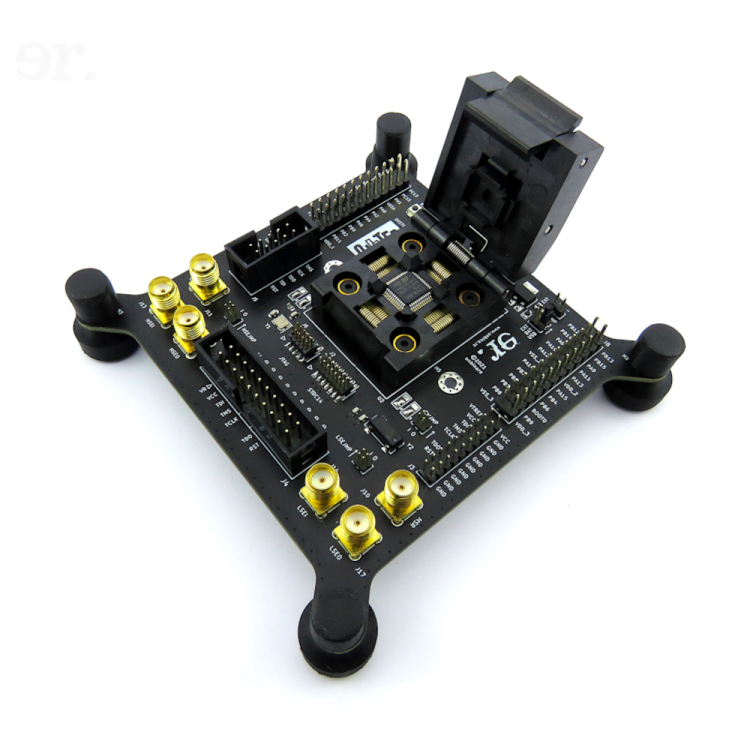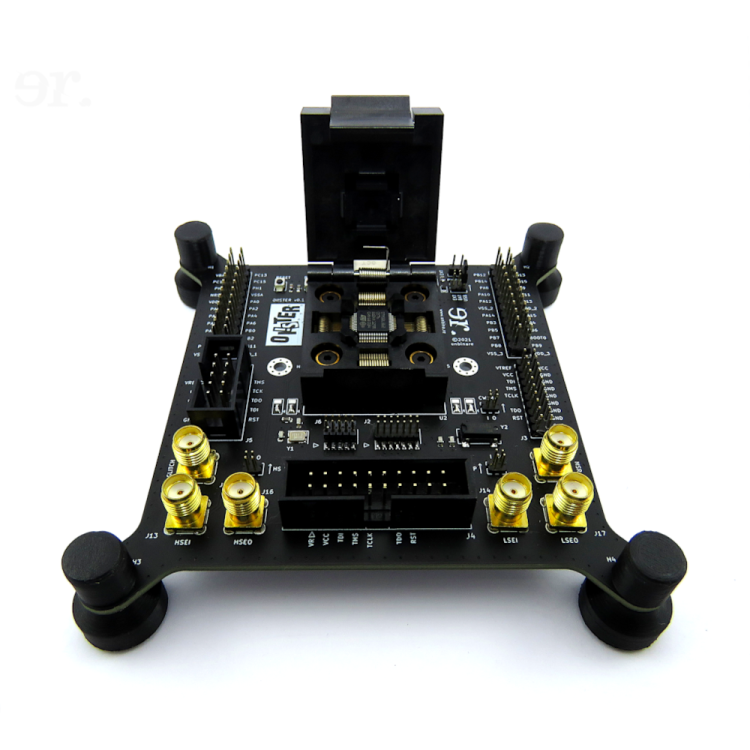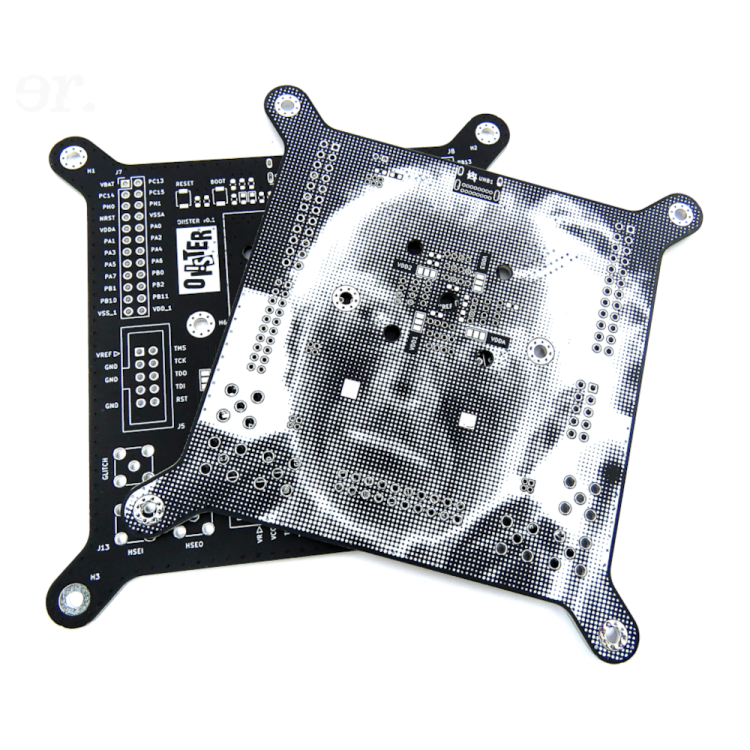OI!STER: Difference between revisions
Unbinawiki (talk | contribs) |
Unbinawiki (talk | contribs) |
||
| Line 240: | Line 240: | ||
! scope="col" colspan="1"| Pin | ! scope="col" colspan="1"| Pin | ||
! scope="col" colspan="1"| Function | ! scope="col" colspan="1"| Function | ||
! scope="col" colspan=" | ! scope="col" colspan="5"| Alternate Function | ||
|- | |- | ||
! scope="row" | 1 | ! scope="row" | 1 | ||
Revision as of 16:37, 17 August 2021
The OI!STER is an STM32L5 Target Board with a QFP48 clamshell socket aimed at debugging and glitching salvaged MCUs. The board can be powered via USB-C, a 2032 coin cell battery on the back of the board or an external power suppy. All pins are broken out in the 24-pin headers on either side at the top of the board. The OI!STER contains five debug headers, to support a wide range of debugging hardware such as a Hydrabus or a Black Magic Probe. It comes with six SMA connectors arranged in I/O pairs. One pair is dedicated to glitching the external LSE clock, another for glitching the external HSE clock and one pair for power analysis and fault injection with a Chipwhisperer. Each SMA connector can be bypassed by removing a small jumper. The OI!STER also has additional solder jumpers for the external clocks and each of the power traces to the MCU to allow for quick experimentation.
A full pinout and additional documentation is currently under development.
Debug Pinout
| Debug Pinout |
|---|
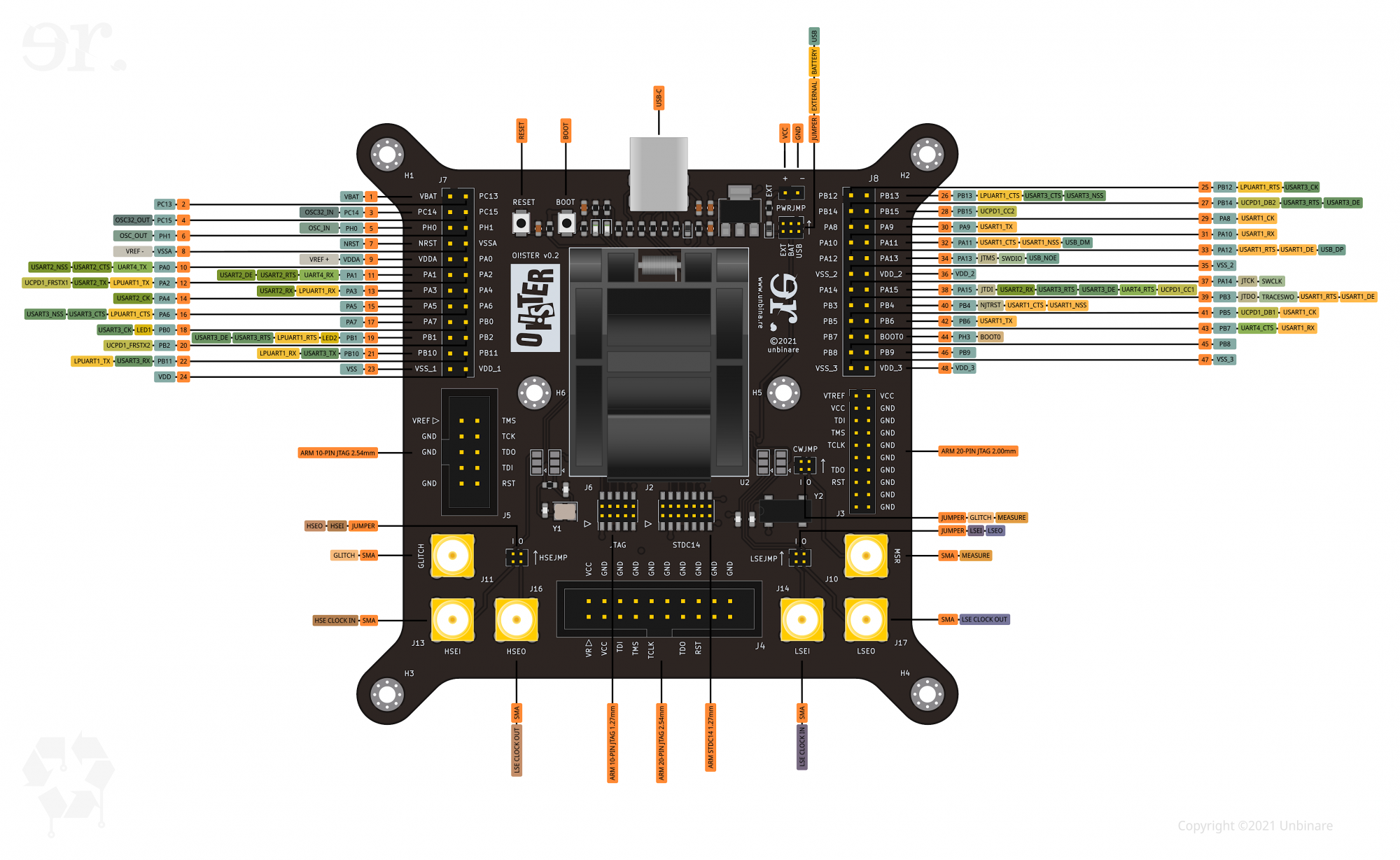
|
| Pin | Function | Alternate Function | |||
|---|---|---|---|---|---|
| 1 | VBAT | ||||
| 2 | PC13 | ||||
| 3 | PC14 | OSC32_IN | |||
| 4 | PC15 | OSC32_OUT | |||
| 5 | PH0 | OSC_IN | |||
| 6 | PH1 | OSC_OUT | |||
| 7 | NRST | ||||
| 8 | VSSA | VREF- | |||
| 9 | VDDA | VREF+ | |||
| 10 | PA0 | UART4_TX | USART2_CTS | ||
| 11 | PA1 | UART4_RX | USART2_RTS | ||
| 12 | PA2 | LPUART1_TX | USART2_TX | ||
| 13 | PA3 | LPUART1_RX | USART2_RX | ||
| 14 | PA4 | USART2_CK | |||
| 15 | PA5 | ||||
| 16 | PA6 | LPUART1_CTS | USART3_CTS | ||
| 17 | PA7 | ||||
| 18 | PB0 | LED1 | USART3_CK | ||
| 19 | PB1 | LED2 | LPUART1_RTS | USART3_RTS | |
| 20 | PB2 | ||||
| 21 | PB10 | LPUART1_RX | USART3_TX | ||
| 22 | PB11 | LPUART1_TX | USART3_RX | ||
| 23 | VSS | ||||
| 24 | VDD | ||||
| 25 | PB12 | USART3_CK | LPUART1_RTS | ||
| 26 | PB13 | USART3_CTS | LPUART1_CTS | ||
| 27 | PB14 | USART3_RTS | |||
| 28 | PB15 | ||||
| 29 | PA8 | USART1_CK | |||
| 30 | PA9 | USART1_TX | |||
| 31 | PA10 | USART1_RX | |||
| 32 | PA11 | USART1_CTS | USB_DM | ||
| 33 | PA12 | USART1_RTS | USB_DP | ||
| 34 | PA13 | JTMS | SWDIO | USB_NOE | |
| 35 | VSS_2 | ||||
| 36 | VDD_2 | ||||
| 37 | PA14 | JTCK | SWCLK | ||
| 38 | PA15 | JTDI | USART2_RX | USART3_RTS | UART4_RTS |
| 39 | PB3 | JTDO | TRACESWO | USART1_RTS | |
| 40 | PB4 | NJTRST | USART1_CTS | UART5_RTS | |
| 41 | PB5 | USART1_CK | UART5_CTS | ||
| 42 | PB6 | USART1_TX | |||
| 43 | PB7 | USART1_RX | UART4_CTS | ||
| 44 | PH3 | BOOT0 | |||
| 45 | PB8 | ||||
| 46 | PB9 | ||||
| 47 | VSS_3 | ||||
| 48 | VDD_3 | ||||
I2C/SPI/OCTOSPI/FDCAN/SDMMC Pinout
| I2C/SPI/OCTOSPI/FDCAN/SDMMC Pinout |
|---|
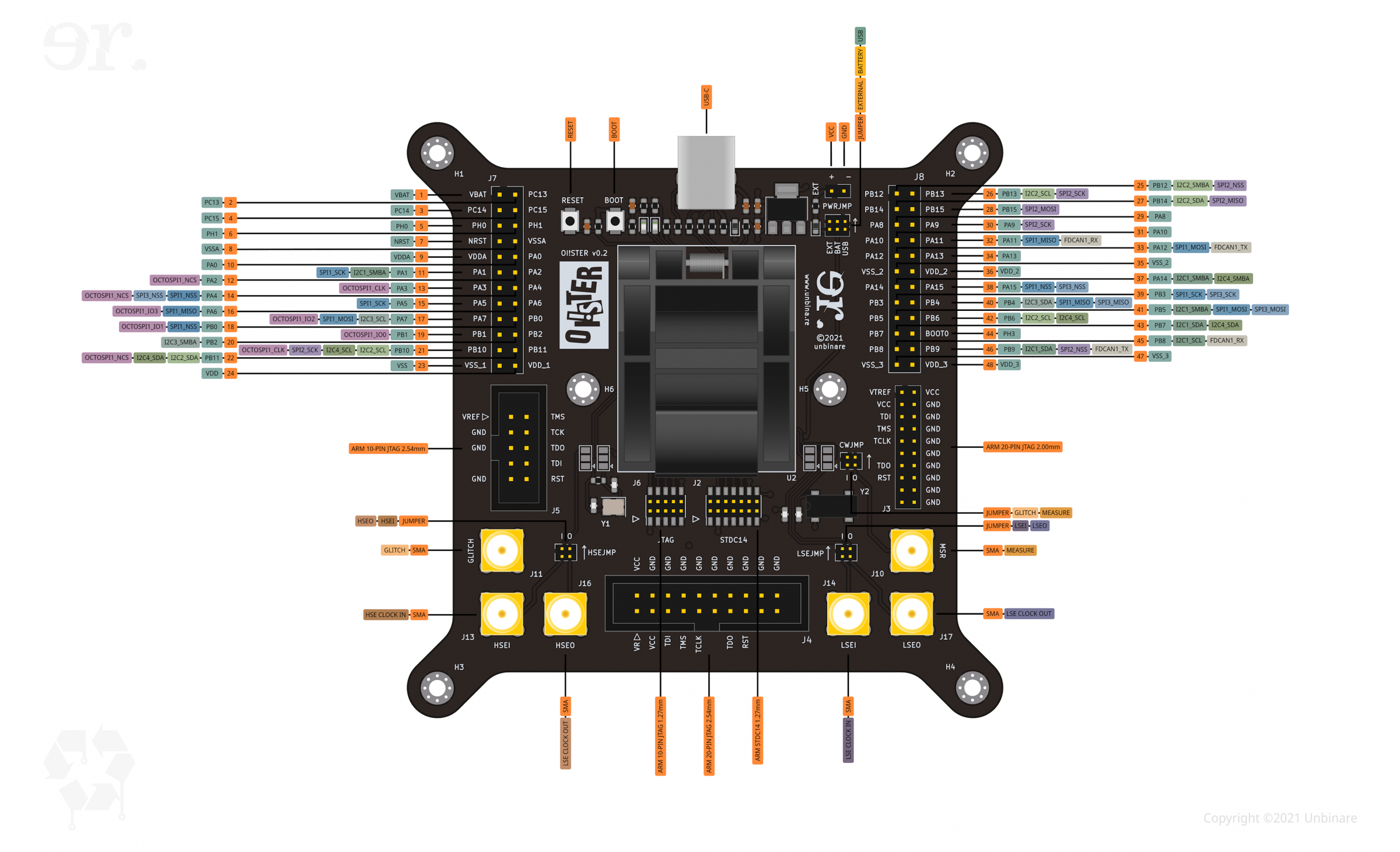
|
| Pin | Function | Alternate Function | ||||
|---|---|---|---|---|---|---|
| 1 | VBAT | |||||
| 2 | PC13 | |||||
| 3 | PC14 | |||||
| 4 | PC15 | |||||
| 5 | PH0 | |||||
| 6 | PH1 | |||||
| 7 | NRST | |||||
| 8 | VSSA | |||||
| 9 | VDDA | |||||
| 10 | PA0 | |||||
| 11 | PA1 | I2C1_SMBA | SPI1_SCK | OCTOSPI1_DQS | ||
| 12 | PA2 | OCTOSPI1_NCS | ||||
| 13 | PA3 | OCTOSPI1_CLK | ||||
| 14 | PA4 | SPI1_NSS | SPI3_NSS | OCTOSPI1_NCS | ||
| 15 | PA5 | SPI1_SCK | ||||
| 16 | PA6 | SPI1_MISO | OCTOSPI1_IO3 | |||
| 17 | PA7 | I2C3_SCL | SPI1_MOSI | OCTOSPI1_IO2 | ||
| 18 | PB0 | SPI1_NSS | OCTOSPI1_IO1 | |||
| 19 | PB1 | OCTOSPI1_IO0 | ||||
| 20 | PB2 | I2C3_SMBA | OCTOSPI1_DQS | |||
| 21 | PB10 | I2C2_SCL | I2C4_SCL | SPI2_SCK | OCTOSPI1_CLK | |
| 22 | PB11 | I2C2_SDA | I2C4_SDA | OCTOSPI1_NCS | ||
| 23 | VSS | |||||
| 24 | VDD | |||||
| 25 | PB12 | IC2C_SMBA | SPI2_NSS | OCTOSPI_NCLK | ||
| 26 | PB13 | I2C2_SCL | SPI2_SCK | |||
| 27 | PB14 | I2C2_SDA | SPI2_MISO | |||
| 28 | PB15 | SPI2_MOSI | ||||
| 29 | PA8 | |||||
| 30 | PA9 | SPI2_SCK | ||||
| 31 | PA10 | |||||
| 32 | PA11 | SPI1_MISO | FDCAN1_RX | |||
| 33 | PA12 | SPI1_MOSI | FDCAN1_TX | |||
| 34 | PA13 | |||||
| 35 | VSS_2 | |||||
| 36 | VDD_2 | |||||
| 37 | PA14 | I2C1_SMBA | I2C4_SMBA | |||
| 38 | PA15 | SPI1_NSS | SPI3_NSS | |||
| 39 | PB3 | SPI1_SCK | SPI3_SCK | |||
| 40 | PB4 | I2C3_SDA | SPI1_MISO | SPI3_MISO | ||
| 41 | PB5 | I2C1_SMBA | SPI1_MOSI | SPI3_MOSI | OCTOSPI_NCLK | |
| 42 | PB6 | I2C2_SCL | I2C4_SCL | |||
| 43 | PB7 | I2C1_SDA | I2C4_SDA | |||
| 44 | PH3 | |||||
| 45 | PB8 | I2C1_SCL | FDCAN1_RX | SDMMC1_CKIN | SDMMC1_D4 | |
| 46 | PB9 | I2C1_SDA | SPI2_NSS | FDCAN1_TX | SDMMC1_CDIR | SDMMC1_D5 |
| 47 | VSS_3 | |||||
| 48 | VDD_3 | |||||
